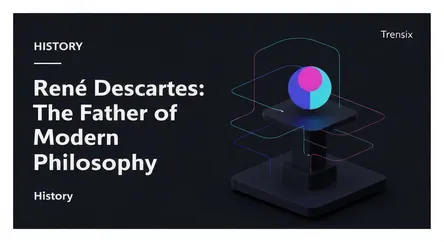History
René Descartes: The Father of Modern Philosophy

An introduction to René Descartes, the French philosopher and mathematician who revolutionized Western thought with his ideas and methods.
What is it?
René Descartes (1596-1650) was a French philosopher, mathematician, and scientist who is widely considered the "Father of Modern Philosophy". He broke away from traditional Scholastic-Aristotelian philosophy to promote a new method of inquiry based on reason and skepticism. His most famous philosophical statement is "Cogito, ergo sum" ("I think, therefore I am"), which became a foundational element of Western thought. In mathematics, he created analytic geometry, bridging the gap between algebra and geometry. This led to the invention of the Cartesian coordinate system, named after him, which remains fundamental in mathematics and science.
Why is it trending?
Descartes' work remains profoundly influential and is continuously studied and debated. His method of hyperbolic doubt, questioning all beliefs to find certainty, is a cornerstone of modern epistemology. The mind-body problem, stemming from his theory of Cartesian dualism (the idea that the mind and body are distinct substances), continues to be a central topic in philosophy and cognitive science. His emphasis on rationalism and a mechanistic view of the universe was a key driver of the Scientific Revolution, influencing figures like Isaac Newton and shaping modern scientific inquiry.
How does it affect people?
The legacy of René Descartes is embedded in modern education and daily life. The Cartesian coordinate system he developed is essential in countless fields, including physics, engineering, computer graphics, and video game design. His insistence on methodological skepticism encourages critical thinking and the questioning of authority, which is a fundamental principle in modern science and liberal arts education. Philosophical discussions about consciousness, identity, and the nature of reality are still heavily framed by the questions he first posed nearly 400 years ago, impacting ethics, law, and our understanding of self.